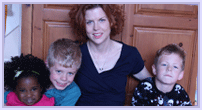Book Review: Jesus Land by Julia Scheeres
 Jesus Land by Julia Scheeres
Jesus Land by Julia Scheeres
Publisher: Counterpoint
First published in 2005
My rating: 4 of 5 stars
Publisher’s Description:
Julia and her adopted brother, David, are sixteen-years-old. Julia is white. David is black. It is the mid-1980s and their family has just moved to rural Indiana, a landscape of cottonwood trees, trailer parks, and an all-encompassing racism. At home are a distant mother—more involved with her church’s missionaries than her own children—and a violent father. In this riveting and heartrending memoir Julia Scheeres takes us from the Midwest to a place beyond imagining: surrounded by natural beauty, the Escuela Caribe—a religious reform school in the Dominican Republic—is characterized by a disciplinary regime that extracts repentance from its students by any means necessary. Julia and David strive to make it through these ordeals and their tale is relayed here with startling immediacy, extreme candor, and wry humor.
I chose this book because my own family is transracial – my husband, my two boys and I are white and my daughter is African American. Because of that, I’m interested in hearing the stories of other transracial families. Good god – I’m glad my family couldn’t be more different from Julia’s family. Julia’s parents adopted her two black brothers because it was the Christian thing to do. It’s another story – this time true – of white people thinking that they can save the black children by immersing them in white society and not acknowledging their race. Julia’s parents are this and worse. They are “spare the rod and spoil the child” Dutch Calvinists. Julia’s mother is cold and distant. Her father, a surgeon, seems to be mostly absent. He is mainly mentioned in relation to beating one of her two black brothers as punishment.
The family lives in a small town in Indiana. It’s mostly white and the use of the n-word is common. David and Julia are best friends but even she distances herself from him when dealing with the issues surrounding his race become too much for her. To ease her guilt she turns to drinking and sex. David and Julia’s parents end up sending them both to a reform school in the Dominican Republic called Esculea Caribe, where life is even harder and more brutal than it was at home. I researched Escuela Caribe a bit after reading this and it appears that as unbelievable as the treatment Julia and David endured sounds, it was true. The school could get away with a lot more being in a loosely regulated foreign country than they ever could have in the United States.
Julia writes her story in a detached manner almost devoid of emotion. It works though because I think when she was experiencing these events as a teenager, she detached herself and became numb to the abuse just to get through it. Reading this book was like listening to the teenage Julia telling you her story directly. Much like The Glass Castle, this book was difficult memoir to read but I’m glad I did.




